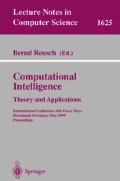Abstract
The recent discussion of Artificial Intelligence (AI) is strongly influenced by controversial concepts of ‘meaning’ and ‘intelligence’. Alan M. Turing gave the problem a specific format when asking: “What are necessary and sufficient conditions that a human being responds to a machine as if it would be (partly) intelligent?” This point of view introduced what later on has been called Turing test: A machine or program can be considered to be intelligent, if human subjects cannot decide whether she or he is communicating with a machine or another human being.
Access this chapter
Tax calculation will be finalised at checkout
Purchases are for personal use only
References
Goddard, N. & Hood, N. (1997) Parallel GENESIS for large scale modeling. In J. M. Bower (Ed.), Computational Neuroscience’ 96. New York: Plenum.
Sheperd, G. M. (Ed) (1998). The Synaptic Organization of the Brain (4th ed.). Oxford: Oxford University Press.
Maass, W. (1997). Networks of Spiking Neurons: The Third Generation of Neural Network Models. Graz: Institute for Theoretical Computer Science, TU Graz.
Menzel, R. 1996. Neuronale Plastizitat, Lernen und Gedäehtnis. In J. Dudel, R. Menzel & R.F. Schmidt (Eds.), Neurowissenschaft. Vom Molektül zur Kognition (pp.485–518). New York: Springer.
Author information
Authors and Affiliations
Editor information
Editors and Affiliations
Rights and permissions
Copyright information
© 1999 Springer-Verlag Berlin Heidelberg
About this paper
Cite this paper
Doeben-Henisch, G., Hasebrook, J.P. (1999). A Toolbox of Artificial Brain Cells to Simulate Classical and Operant Learning Behavior. In: Reusch, B. (eds) Computational Intelligence. Fuzzy Days 1999. Lecture Notes in Computer Science, vol 1625. Springer, Berlin, Heidelberg. https://doi.org/10.1007/3-540-48774-3_78
Download citation
DOI: https://doi.org/10.1007/3-540-48774-3_78
Publisher Name: Springer, Berlin, Heidelberg
Print ISBN: 978-3-540-66050-7
Online ISBN: 978-3-540-48774-6
eBook Packages: Springer Book Archive

